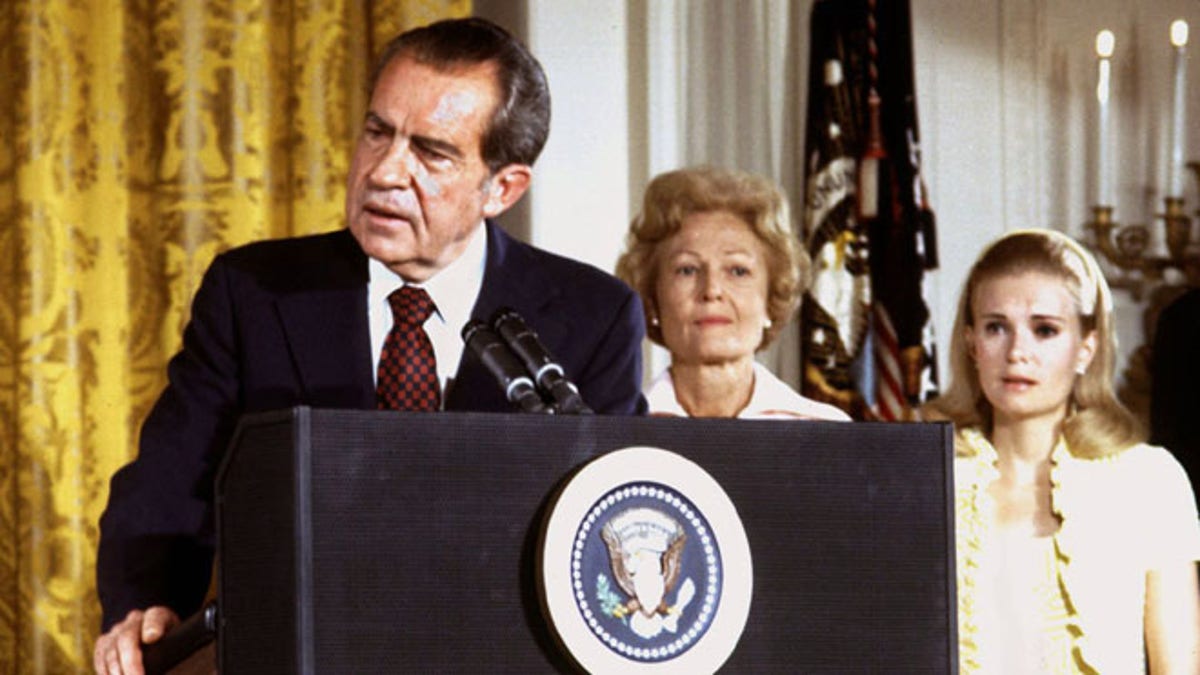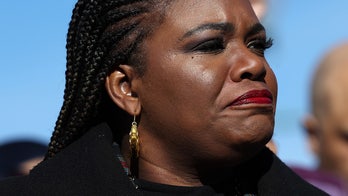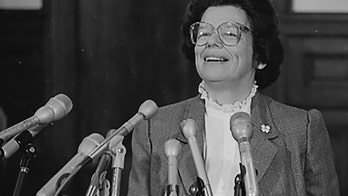
In this file photo, U.S. President Richard Nixon, listened to by First lady Pat Nixon and daughter Tricia Nixon (R), says goodbye to family and staff in the White House East Room on August 9, 1974. (Reuters)
Four decades after the epic scandal that drove President Richard Nixon from office, how well do you remember the cast of characters, their quirky traits, and foul deeds?
Fox News chief Washington correspondent James Rosen, author of "The Strong Man: John Mitchell and the Secrets of Watergate," has composed this trivia quiz to test your memory of what you remember firsthand, learned in school -- or were never taught in school.
Answers appear at bottom.
I. THE BREAK-IN:
1. On which floor of the Watergate office building was the suite belonging to the Democratic National Committee (DNC) located?
a. The first
b. The second
c. The sixth
d. The seventh
2. What was the name of the former FBI agent stationed across the street, in the Howard Johnson's Motor Lodge, who served as a lookout and wiretap monitor for the listening devices installed in the DNC?
a. James McCord
b. Alfred C. Baldwin III
c. Donald Segretti
d. Thomas Gregory
3. Who was the Democratic Party official whose telephone was the only one wiretapped and monitored for the three-week lifespan of the surveillance operation carried out at the DNC?
a. Chairman Lawrence F. O'Brien
b. Deputy Chairman Stanley Greigg
c. Treasurer Robert Strauss
d. Association of State Party Chairmen Executive Director R. Spencer Oliver, Jr.
4. Which of the Watergate burglars was still on the payroll of the Central Intelligence Agency at the time of the break-in, reporting to his case officer on the activities of the break-in team?
a. Eugenio Martinez
b. Frank Sturgis
c. Virgilio Gonzalez
d. Bernard Barker
5. Name the former FBI agent -- never arrested -- whose mysterious actions in and around the Watergate complex on the night of June 16, 1972, have led researchers to call him "the sixth man" present for the break-in?
a. E. Howard Hunt
b. James Jesus Angleton
c. Carmine Bellino
d. Lou Russell
II. THE COVER-UP:
6. Which of these men used a busman's change dispenser to handle the "hush money" that was paid to keep the burglars and their attorneys quiet?
a. Jack Caulfield
b. Tony Ulasewicz
c. Myles Ambrose
d. Joe Woods
7. On which date did John Dean have his famous "cancer on the presidency" meeting with President Nixon?
a. Sept. 15, 1972
b. March 13, 1973
c. March 21, 1973
d. April 30, 1973
8. Who threatened that "every tree in the forest will fall" if the Nixon White House blamed the DNC operation on the Central Intelligence Agency?
a. CIA Director Richard Helms
b. Deputy CIA Director Vernon Walters
c. FBI Associate Director W. Mark Felt
d. Watergate wiretapper James McCord
9. Which of these 1970s-era senators was not on the Senate Watergate committee?
a. Mike Mansfield, D-Mont.
b. Herman Talmadge, D-Ga.
c. Joseph Montoya, D-N.M.
d. Edward Gurney, R-Fla.
10. "I do not think there was ever any discussion that there would not be a cover-up," testified which Nixon re-election campaign official?
a. John Mitchell
b. Jeb Magruder
c. G. Gordon Liddy
d. Powell Moore
III. THE FINAL DAYS:
11. True or false: Alexander Butterfield gave his superiors in the Nixon White House advance notice that he was going to disclose the existence of the president's taping system.
a. True
b. False
12. What did White House chief of staff Alexander Haig say was responsible for the eighteen-and-a-half-minute gap on the recording of President Nixon's June 20, 1972 conversation with Haig's predecessor, H.R. Haldeman?
a. "a Democrat mole"
b. "the president's secretary"
c. "our long national nightmare"
d. "a sinister force"
13. In the 8-0 Supreme Court ruling that forced President Nixon to turn over tapes subpoenaed by federal investigators, which justice recused himself, because he had formerly worked for Attorney General John Mitchell at the Department of Justice?
a. Warren Burger
b. William Rehnquist
c. Potter Stewart
d. G. Harrold Carswell
14. Which clergyman organized a committee to defend President Nixon in his final months in office?
a. Rev. Sun Myung Moon
b. Rev. Billy Graham
c. Rabbi Baruch Korff
d. Maharishi Mahesh Yogi
15. In his last hours in office, President Nixon was consoled by an aide who told him history would judge him more kindly than his contemporaries had; to which Nixon replied, "That depends on who's writing the history." That aide was:
a. Alexander Haig
b. Henry Kissinger
c. Leonard Garment
d. Diane Sawyer
Answers:
THE BREAK-IN: 1. c; 2. b; 3. d; 4. a; 5. d
THE COVER-UP: 6. b; 7. c; 8. d; 9. a; 10. b
THE FINAL DAYS: 11. a; 12. d; 13. b; 14. c; 15. b




